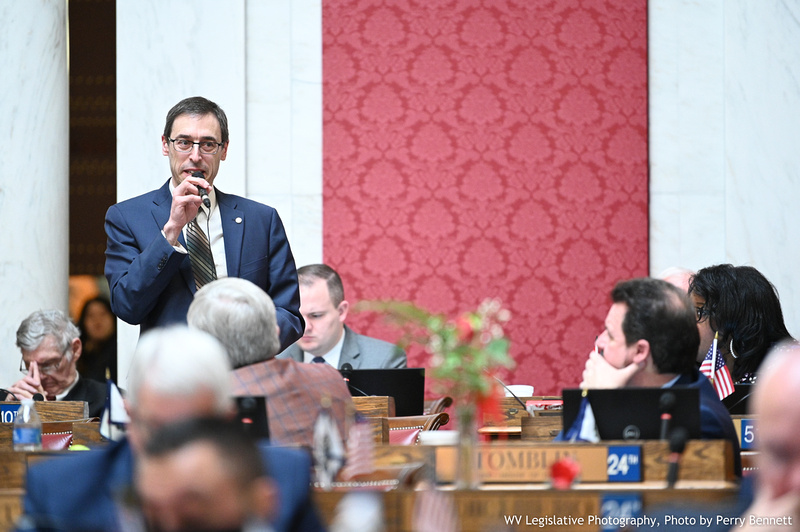Photo caption: Del. Evan Hansen, D-Monongalia, scored the the highest of all West Virginia legislators on the League of Women Voters scorecard, with 84%. (Perry Bennett | West Virginia Legislative Photography)
Just 11 of 134 legislators — all Democrats — scored higher than 50% on the scorecard
BY: CAITY COYNE – NOVEMBER 2, 2023 6:00 AM
For the first time this year, the League of Women Voters of West Virginia created and released a scorecard to analyze key votes from legislators in the 2023 Regular Session. Only 11 legislators — all Democrats — scored higher than 50% on priority issues set by the League, according to the scorecard.
Those priorities — which are based on positions set by the national League — come from four categories: safeguarding equal rights, protecting children and families, creating a sustainable future and making it easier to vote in elections.
The scorecard focused on votes from 25 of the 333 total bills that were passed last session. They span from environmental policies like limiting the amount of toxic per- and polyfluorinated substances (PFAS) in water sources to laws that limit health care options for transgender youth in the state.
“We literally went through all 333 bills because we knew no voter should be expected to do that. We wanted to select a reasonably sized number to fulfill our mission to provide better voter information for people who can’t pay that much attention to the Legislature,” said Judy Ball, president of the Monongalia County Chapter of the League of Women Voters. “We do advocacy, we do education but we also have a priority to do voter education and that’s what this scorecard is.”
The league is a nonpartisan organization, and the scorecard is organized to present votes without party affiliation. The priorities set by the league — both locally and nationally — have been long held, and are not tied to one political party even as they tend to reflect more progressive stances, Ball said.
“These positions that we use to build our priorities every session, many of them have been in place for decades. When they were adopted, they were considered pretty middle of the road,” Ball said. “What we have found over time is when the league gets accused of being so progressive, I take that as evidence of how far our political culture has shifted to the right.”
Of note this year, Ball said, was a lack of any substantive bills to simplify voting in West Virginia. While some bills were introduced and voted on to change campaign finance rules and other technicalities, no bill that would have expanded the ability to vote made it to a committee.
“That’s really disappointing to us to see, and it is concerning,” Ball said. “That is a crucial priority of ours and we want to see the state understand that suppressing voters, making it more difficult to vote, is not healthy or good for anyone.”
Of the 25 bills selected to be analyzed, 10 were related to safeguarding equal rights in the state. Those included laws like the Religious Freedom Restoration Act — which allows people to practice discrimination based on their religious beliefs — and several educational initiatives that Ball said would disproportionately harm marginalized students in the state.
“The lack of attention to the potential adverse consequences of these bills is really something that concerns us,” Ball said. “There are all sorts of vulnerable populations in West Virginia that we need to provide protections for. It’s not just the LGBTQ+ community, it’s also people of color, of different socioeconomic classes. We need to work as a state to make sure the government and laws are working for everyone.”
Of the 134 state legislators, Del. Evan Hansen, D-Monongalia, scored the highest on the scorecard, with 84%. He was followed by Del. Mike Pushkin, D-Kannawha, and former Del. Danielle Walker, D-Monongalia, who both scored 76%. Del. Kayla Young, D-Kanawha, came fourth on the scorecard with 72%. Dels. Sean Hornbuckle, D-Cabell, and John Williams, D-Monongalia, tied for the fifth highest scores, with 68%.
Ball, who serves as the chair of the League’s newly formed Legislative Action Working Group, said the scorecard is the organization’s newest initiative to ensure voters are educated on what their elected officials are doing while in office. Keeping track of the more than 2,000 bills introduced each year is burdensome, and most people – especially those who don’t work in politics – don’t have the time to parse through the legislation or discussion surrounding it.
“What we look at here is about substance more than anything. It’s not about party affiliation, and bad policies that come from our Legislature are frequently bipartisan. It doesn’t make much of a difference if you have an ‘R’ or a ‘D’ next to your name, it’s the policy,” Ball said. “It’s important that voters know what their legislators are doing, and we try to facilitate that as much as we can. We hope this scorecard can help them.”
** West Virginia Watch is a nonprofit media source. Articles are shared under creative commons license. Please visit https://westvirginiawatch.com/ for more independent Mountain State news coverage.

